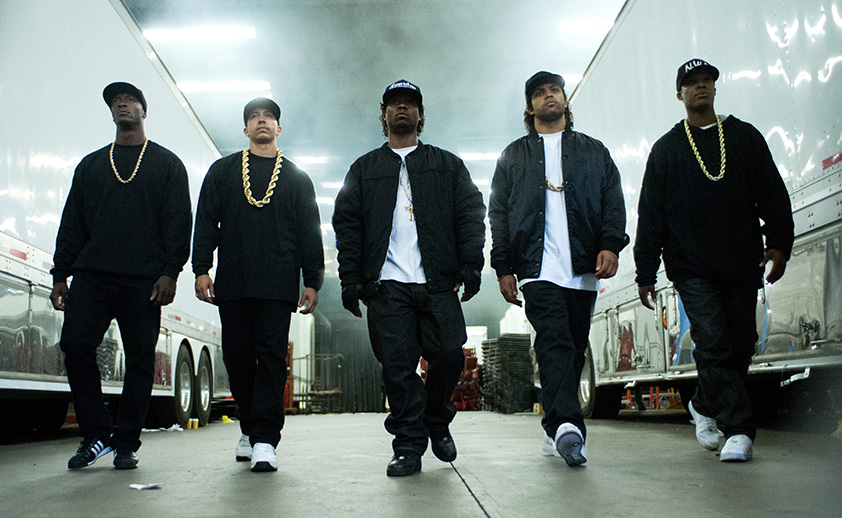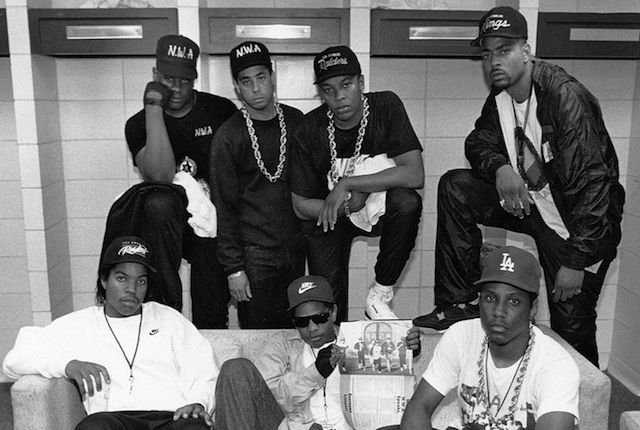|
Gawker- In the Wall Street Journal today, Jason L. Riley has a very... interesting reading of what Straight Outta Compton and N.W.A. were all about:
"The film is more interested in presenting the rappers as authentic voices of decent young black men in poor communities who are regularly victimized by police. Still, the viewer can’t help but notice that our protagonists regularly engage in criminal behavior, dress like gang members in areas infested by ruffians and defy the police who suspect them of being up to no good. Their problem is not that the cops harass them but that the cops interfere with their lawbreaking." "In one of the film’s early scenes, designed to illustrate the kinds of experiences that shaped the rappers’ upbringing, a young Ice Cube is riding home on a yellow school bus when a group of gang members pulls alongside in a sedan. Some of the kids on the bus start shouting out the window and playfully flashing gang signs at the men in the car. The gang members respond by stopping the school bus, forcing their way inside and putting a pistol to the head of one of the teenage taunters. The scene suggests that the biggest bane of the black community isn’t the police officer but the black hoodlum. Yet Ice Cube and other gangsta rappers would go on to great fame and fortune penning lyrics that claimed the reverse." You mean to tell me that not all gang members in Compton are good guys and not all members of the LAPD are racist? To think that I wasted all that money on a movie ticket for a cinematic experience that was based, in part, on a false narrative! I can't believe the members of an all black, ground breaking rap group painted themselves as a heroic bunch of upstart artists that were being discriminated against by the police when they HELPED PRODUCE THE MOVIE. Where has all the integrity in filmmaking gone? This may be hard for a right winged journalist that probably didn't see a black person until college to understand, but we know that the story told by 'Straight Outta Compton' is a glorified version of their history. Let me ask you a question Mr. Riley. If you were writing an autobiography about yourself, would you include a chapter about the time you drank too much vodka, threw up on your girlfriend, and pissed yourself in public? I didn't think so. We paid for production value. If we wanted hard hitting facts we would have stayed home and watched documentaries on Netflix. The people that were interested enough in hip hop music, and more specifically N.W.A., to watch a two and half hour movie about them know that they had their fair share of skeletons in their closet. I think the film actually did a more than adequate job of showing that they weren't only victims of unenforced police brutality, but also victims of the area in which they were raised, the peers they grew up amongst, and at times, even their own decision making. My favorite part about this Wall Street Journal review of 'Straight Outta Compton'? The fact that you know this subject got passed around the room a half dozen times until someone was like "Hey Jason, you're turn to fall on the grenade buddy". This guy had less than zero interest in going to see this movie. I picture him in there with a notepad and a pen. Constantly scratching his head and furrowing his brow. Furiously scribbling down notes. I bet he had "the bane of the black community" underlined like 5 times. Can't even blame him, that's just a hard hitting journalistic reference right there. He definitely didn't realize that red and blue are gang colors, just assumed that all the ruffians in black clothes were trying to fit into an atmosphere of crime. You think it's a coincidence that this guy choose one of the first scenes as the main example in his article? There's not a shot in hell he sat through that whole movie. He probably already had a full page of notes, front and back, and was safely in his car relieved that he didn't let a hard 'N' slip in public by the 45 minute mark. Let's be honest, if he watched the whole movie he probably would have written an entire editorial about how Jerry Heller is a victimized, sympathetic figure. I know I sound pessimistic, but I seriously might pen a letter to the Wall Street Journal requesting that Jason L. Riley cover all predominantly black music, movies, and social phenomenons. I don't know about you but I'm psyched to see the result.
0 Comments
Leave a Reply. |
Categories
All
Archives
January 2020
|


 RSS Feed
RSS Feed
